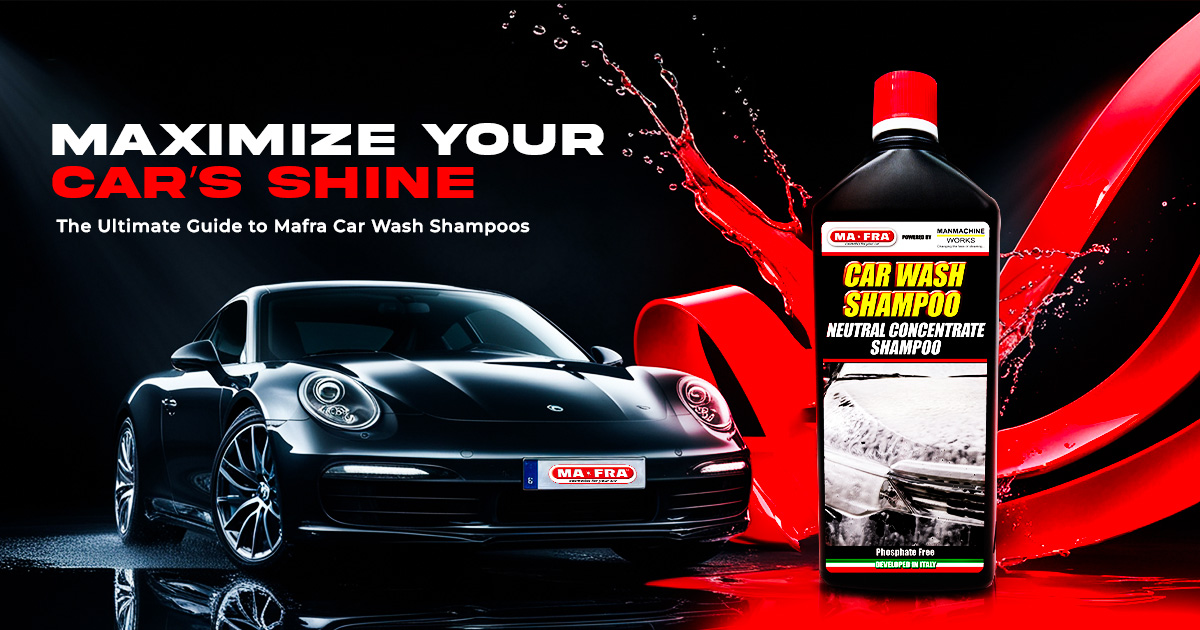Car wash chemicals are a critical aspect of the vehicle detailing process, offering a range of benefits from deep cleaning to paint protection. As car detailing evolves, so do the variety and sophistication of these chemicals, allowing both professionals and car enthusiasts to maintain their vehicles more effectively. Whether you're doing a touchless wash or a manual scrub, understanding the right car wash chemicals to use is essential for achieving a polished, protected, and showroom-ready vehicle.
Car wash chemicals are designed to address various cleaning needs, such as removing grime, road contaminants, and protecting the car's paintwork. However, the market is vast, and not all car wash chemicals are created equally. Some are formulated for specific applications, like wheel cleaning or glass polishing, while others are designed for all-purpose use. Choosing the right type of chemical will ensure not only a thorough clean but also long-term protection and gloss for your vehicle.
Types of Car Wash Chemicals
The detailing industry offers a diverse range of car wash chemicals, each serving a unique function in the washing process. Selecting the right one can make all the difference in achieving a professional finish. Below are some common types of car wash chemicals:
Pre-Wash Solutions
Pre-wash solutions are essential in loosening up tough dirt, bird droppings, bugs, and other contaminants before the main wash. These car wash chemicals help to soften grime, making it easier to remove during washing without excessive scrubbing that could damage the paint. Products like all-purpose cleaners (APCs) and snow foams are popular pre-wash choices due to their deep penetration and softening power.
Shampoos and Detergents
Shampoos are the backbone of car wash chemicals, designed to clean the car’s surface effectively while being gentle enough to avoid stripping wax or sealant. There are various kinds, such as high-sudsing shampoos for hand-washing and low-foam versions suited for foam cannons. pH-neutral shampoos are highly recommended for regular use as they are gentle on the paint and safe for all surfaces.
Foam Cleaners
Foam cleaners, commonly used in touchless wash systems, provide a thick blanket of foam that adheres to the surface, encapsulating dirt particles and making them easy to rinse off. These car wash chemicals are formulated to generate rich suds that cling to vertical surfaces, maximizing cleaning power. High-foaming formulas enhance the cleaning process by increasing the dwell time, which allows the chemicals to break down dirt and grime effectively.
Degreasers and Tar Removers
For heavier contamination, such as tar, grease, or brake dust, car wash chemicals like degreasers and tar removers are necessary. These specialized products are formulated to tackle stubborn grime that regular shampoos can’t handle. They are commonly used on wheel arches, engine bays, and undercarriages, where road film and grease accumulate. It's important to use these chemicals cautiously and according to the manufacturer’s guidelines to avoid damaging sensitive surfaces.
Waxes and Protectants
While some car wash chemicals are designed to clean, others focus on protection. Waxes and sealants fall into this category, providing a protective barrier against environmental contaminants while enhancing the vehicle's gloss. Synthetic polymer-based waxes are popular due to their durability and ease of application, offering months of protection. Some car wash shampoos also come with added wax properties, allowing you to clean and protect your car in one step.
Interior Cleaners and Odor Neutralizers
Interior detailing requires a separate range of car wash chemicals designed for surfaces like leather, vinyl, fabric, and plastics. Interior cleaners are formulated to lift dirt without harming the material, while odor neutralizers target and eliminate unpleasant smells. Products that are multipurpose and safe for all interior surfaces are ideal for quick detailing sessions.
Choosing the Right Car Wash Chemical
Selecting the right car wash chemical depends on several factors, such as your car’s surface type, level of contamination, and desired finish. Here’s how to make an informed decision:
Surface and Paint Compatibility
One of the key aspects of choosing car wash chemicals is ensuring they are compatible with your vehicle's paint and surfaces. Some products are specifically formulated for sensitive finishes like matte paint, while others may be too harsh and strip off protective layers. Always read the product label to ensure it’s safe for your vehicle’s paint type.
Foam vs. Liquid Formulations
Foam-based car wash chemicals are excellent for touchless washes and provide deep cleaning with minimal contact. Liquid formulations, on the other hand, are more versatile and can be used with wash mitts for a more thorough scrub. Foam cleaners are great for lifting and loosening dirt, while liquid car wash soaps are better for precise application and hand-washing.
pH Balanced vs. Acidic/Alkaline Cleaners
Car wash chemicals vary in pH levels, and choosing the right one can make a big difference. pH-balanced shampoos are safe for all surfaces and won’t strip wax or sealants. Acidic or alkaline cleaners, although powerful, are designed for specific purposes like removing mineral deposits or grease. It’s essential to choose a pH-balanced chemical for regular washes and reserve acidic or alkaline options for targeted cleaning.
Concentrate vs. Ready-to-Use
Many car wash chemicals come as concentrates, offering more product per bottle and the flexibility to dilute according to the level of cleaning needed. Ready-to-use (RTU) products, however, are convenient and pre-diluted for quick use. If you’re looking to customize your cleaning power and save on cost, concentrates are a great option. However, for simplicity and efficiency, RTU formulas are an excellent choice.
Specialty Car Wash Chemicals
Certain detailing tasks require specialty car wash chemicals to achieve specific results:
Ceramic & SiO2-Based Washes
Ceramic-based car wash chemicals, containing SiO2 (silicon dioxide), provide additional hydrophobic protection and enhance the paint's gloss. These products form a semi-permanent layer on the paint, offering water-beading effects that keep the car looking cleaner for longer.
Touchless Wash Additives
Touchless washes require unique car wash chemicals that can effectively break down dirt and road film without the need for manual scrubbing. These chemicals are strong yet gentle, preventing surface damage while ensuring thorough cleaning.
Tire & Wheel Cleaners
Wheels and tires accumulate tough grime, brake dust, and road contaminants that require dedicated car wash chemicals. Tire cleaners often have degreasing properties to break down tough dirt, while wheel cleaners are formulated to safely remove brake dust and grime from a variety of wheel finishes, including chrome, alloy, and painted surfaces.
Gloss Enhancers & Drying Agents
Gloss enhancers are car wash chemicals designed to add extra shine to your vehicle’s paintwork. Drying agents, on the other hand, help water bead off quickly, reducing the chances of water spots and making the drying process easier.
Eco-Friendly & Biodegradable Options
As environmental awareness grows, eco-friendly car wash chemicals have become increasingly popular. Biodegradable formulas are designed to break down naturally, reducing harm to water sources and wildlife. They provide a sustainable option for those who want to minimize their environmental impact while still maintaining an effective cleaning routine.
Opting for waterless car wash products is another way to be eco-conscious, as these car wash chemicals require little to no water and are perfect for urban environments where water use may be restricted.
Proper Application Techniques
Applying car wash chemicals correctly is key to achieving the best results without damaging the car’s surface. Below are some important tips for proper application:
Mixing Ratios & Dilution
When using concentrated car wash chemicals, it’s crucial to follow the recommended dilution ratios for safe and effective cleaning. Overly concentrated solutions can damage paint, while under-diluted mixtures may not clean effectively.
Tools & Accessories
Using the right tools, such as microfiber towels, wash mitts, foam guns, and detailing brushes, can significantly enhance the effectiveness of your car wash chemicals. Foam guns help in evenly distributing foam cleaners, while microfiber towels and mitts ensure gentle cleaning without scratching the surface.
Avoiding Damage & Swirl Marks
Always wash in shaded areas to prevent water spots and work in sections to ensure thorough cleaning. Use gentle, straight-line motions instead of circular scrubbing to avoid swirl marks and damage to the paint.
Storage and Handling of Car Wash Chemicals
Proper storage of car wash chemicals is essential to maintain their quality. Keep them in a cool, dry place, away from direct sunlight and extreme temperatures. Ensure that lids are tightly sealed to prevent evaporation or contamination.
When handling concentrated car wash chemicals, wear protective gloves and eyewear if necessary. Proper ventilation is important, especially when using strong cleaners, to avoid inhalation of fumes.
Frequently Asked Questions
How to Choose the Best Car Wash Chemical for Your Needs?
Consider the surface type, level of grime, and the result you’re aiming for. Read product labels to find the right match for your vehicle and needs.
Can Car Wash Chemicals Damage Paint?
If used improperly, some car wash chemicals can damage paint. Always follow the manufacturer's instructions and use the appropriate chemical for your car's surface.
What is the Difference Between pH-Balanced and pH-Neutral Car Wash Soaps?
pH-neutral soaps are gentle and safe for all surfaces, ideal for regular washes. pH-balanced soaps may have additives to clean specific contaminants but are still formulated to be safe for most paint types.
How Often Should You Use Different Car Wash Chemicals?
For regular maintenance, washing your car every one to two weeks is optimal. For waxes and sealants, applying them every three to four months helps maintain protection and shine.
Conclusion
Car wash chemicals play a pivotal role in car detailing, from pre-wash to final protection. By choosing the right products, using proper application techniques, and considering eco-friendly options, you can achieve a clean, glossy, and well-protected finish on your vehicle. With the right knowledge and approach, car wash chemicals can significantly enhance the appearance and longevity of your car's paintwork, keeping it in pristine condition for years to come.
 english
english 










